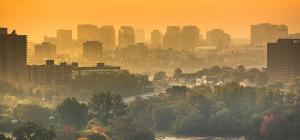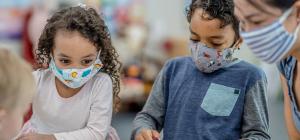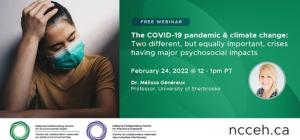Psychosocial impacts of the COVID-19 pandemic: A frame of reference from lessons learned through disasters in Canada
Dr. Mélissa Généreux
There is no doubt that mental health challenges posed by disasters will increase due to climate, demographic and social changes. This presentation details findings from Canadian-led studies on the psychosocial impacts resulting from communities who experienced large-scale disasters in Canada. Such traumatic events include the COVID-19 pandemic, the 2019 Quebec spring floods, the 2016 Fort McMurray wildfires, and the 2013 Lac-Mégantic train derailment. There are links between observed psychosocial impacts and recovery during these recent disasters, with learnings that could be applied to the COVID-19 pandemic that could promote individual and community resilience following disasters. This session will be relevant to environmental and public health professionals in health prevention and health promotion roles.
Presenter: Mélissa Généreux holds a doctorate in medicine, a master's degree in public health and a specialization in community medicine from the University of Montreal. After having been appointed as Director of Public Health for six years in the Estrie region, she now acts as a medical adviser both at the regional and provincial level in Quebec. She has developed an expertise in the field of disaster management and psychosocial recovery through her strong involvement during the Lac-Mégantic rail tragedy in 2013 that destroyed a large part of the downtown area, both as a researcher and as a decision-maker, as well as through her support brought to public health authorities as a consultant during the 2016 Fort McMurray fires in Alberta and the 2017 and 2019 spring floods in Quebec. As a member of the WHO Health Emergency and Disaster Risk Management Framework Research Network (TPRN), she has developed a strong international network and has contributed to several knowledge creation and transition activities in the field of disaster risk reduction (e.g. WHO expert meeting, workshops, conferences, scientific papers, reports, book chapters). She is currently leading two studies, one on the sociosanitary consequences during and after the 2019 spring floods in Quebec, and another on the psychological and behavioral response to the COVID-19 pandemic.
See Mélissa Généreux's "Psychosocial Impacts of the COVID-19 Results of a Broad Investigation in Quebec" publication here.









